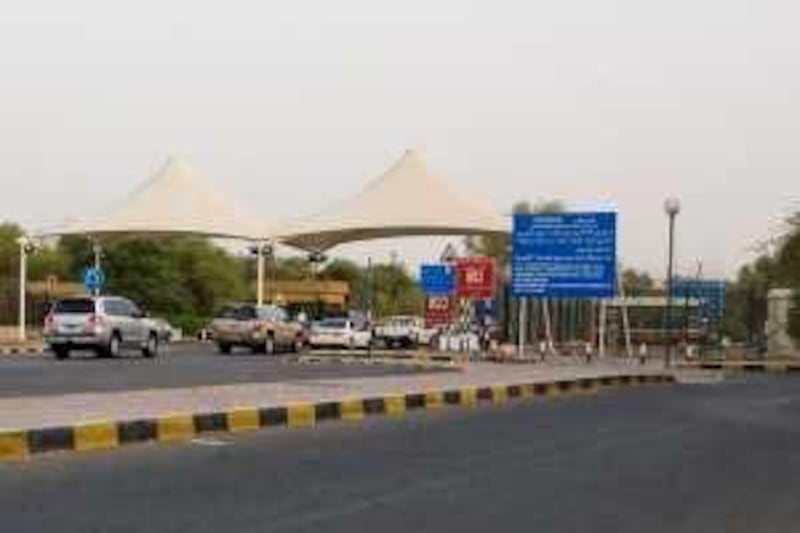AL AIN // The high cost of rent in major UAE cities is encouraging frustrated residents to seek accommodation beyond the country's borders. People working in Abu Dhabi, Dubai and Al Ain are increasingly looking to reside in Buraimi, property agents say. As a result, rental prices in the city, which lies adjacent to Al Ain on the Omani side of the border, are going up and vacant homes are becoming scarce.
Of 10 Buraimi property agents visited last week, only two had apartments or villas available for rent. The agents said most homes had been rented to Emiratis, other GCC citizens and expatriates working in the UAE. "Look around when you drive and you will see as many Abu Dhabi licence plates on cars as you do Omani ones," said Matar Hamad al Oraimi of Abu Riyadh Real Estate in Buraimi. He expects the rents to remain 30 per cent higher on average than they were two years ago if the border remains open.
A newly built three-bedroom villa with living room, dining room, three bathrooms, a large kitchen and garden rents for Dh36,000 a year on average, according to real estate listings. A year ago it would have rented for less than Dh20,000. By comparison, a similar size villa in Al Ain rents for at least Dh80,000, and in Abu Dhabi the price would be at least Dh200,000. Vani Bhagavath, of Oman Homes, said rents had risen by 25 per cent in the past year, "a direct result of the high demand being put on the Buraimi real estate market by those coming from the UAE to live in Oman".
Residents seem to be willing to endure the border crossing, which may take from 10 to 45 minutes, and the long commute - an hour to Dubai and two hours to Abu Dhabi. Some even find it worthwhile to purchase, rather than rent, accommodation in Oman. "I bought my five bedroom villa in Buraimi a little over five years ago for Dh180,000," said Saeed al Nuami, 32, an Emirati holding a government job in Abu Dhabi. "A villa of the same size in Abu Dhabi or Dubai would cost me over Dh1.5 million to buy. I figured that with the amount of rent it would cost me to rent a large villa in Abu Dhabi for a year, I could buy a house in Buraimi."
Mr al Nuaimi said commuting to Abu Dhabi from Oman made "perfect sense", despite a lack of amenities in Buraimi. "There are relatively few facilities available as far as shopping and restaurants are concerned," he said. "This doesn't really pose a problem for me as crossing the border into Al Ain is easy. In Al Ain there are malls, restaurants, cinemas, and everything Buraimi lacks that my children and my wife would want." In the UAE, there are no laws against working in one country and living in another. Emiratis and other GCC citizens can cross the Al Hili and Al Mudeef checkpoints without having to endure stringent immigration and customs checks. "GCC citizens tend to use the Al Mudeef checkpoint designated for them as it is less crowded with those wanting to cross the border," Mr al Oraimi said. Non-GCC citizens are required to use Al Hili. "In either case," he said, "the wait to get across the border is usually less than 45 minutes."
When Al Mudeef checkpoint was closed in July because of a rise in illegal crossings, Omani property agents feared that expatriates renting in Buraimi would go back to Al Ain. But a UAE presidential decree ordered soon afterwards that the border point be reopened for humanitarian reasons. "I remember that time," Mr al Oraimi said. "We expected that property values in Buraimi would fall and property values in Al Ain would go up as those working in Al Ain would leave instead of driving a little over 20 kilometres to get to the Khatam al Shakla border point." A British expatriate working in the defence industry in Abu Dhabi said he crossed the border every day. "The border patrol agents on both sides of the border have come to know me on a first-name basis," he said even though he requested anonymity for this article. "My home is 10 minutes away from both the Al Hili and Mudeef checkpoints. At the busiest of times, I have to sit in traffic for 45 minutes to cross the border. At other times, crossing the border takes less than 10 minutes, and from the border, the Al Ain town centre is less than five minutes away." Meanwhile, property agents have also reported that a growing number of Abu Dhabi residents are moving to Dubai to escape the capital's high rents. Prices in Abu Dhabi are expected to remain stable this year, but not to dip much below their peak of late last year. Rent for a one-bedroom apartment in the capital can be up to Dh150,000. In Dubai, some two-bedroom villas in The Springs and Arabian Ranches are now available for the same price, down from their peak of Dh200,000 last summer. "I recently signed with two clients who chose new homes in Dubai because the prices in Abu Dhabi were no longer affordable for them," said Angelo Kazan, a leasing consultant at Better Homes. Hitendar Lala, also of Better Homes, added: "My clients chose a new home in the Gardens and prefer to commute daily to Abu Dhabi as the logistics of living in Abu Dhabi, such as parking and access, were no longer practical for them." ealghalib@thenational.ae * With additional reporting by Robert Ditcham






